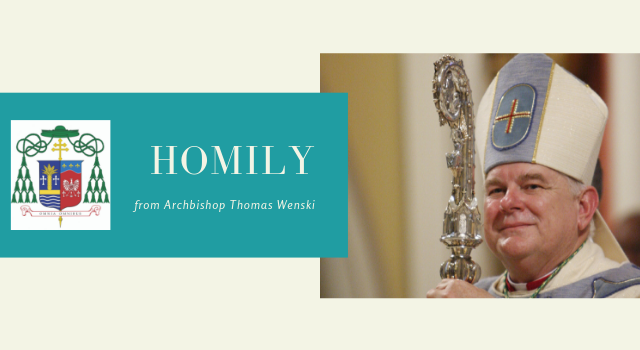By Archbishop Thomas Wenski - The Archdiocese of Miami
Archbishop Thomas Wenski preached this homily while celebrating a “send-off” Mass at St. Mary Cathedral for a group of more than 300 members of the Neocatechumenal Way, who are traveling as pilgrims to the Holy Land in July. The Mass took place on the feast of Sts. Peter and Paul, June 29, 2022.
Today we celebrate the great feast of Saints Peter and Paul. This is a big feast day in Rome — today the pope gives to newly appointed metropolitan archbishops a pallium, a narrow circular band made of lamb’s wool placed round his shoulders symbolizing his sharing with the Bishop of Rome the ministry of shepherding God’s flock. I received my pallium on this day in 2010 — 12 years ago!
The Church of Rome, founded by the Apostles Peter and Paul in their blood, is in a real sense the "mother" of all the other churches. Our union with the Church of Rome is expressed in the communion of mind and heart with Peter and his successors. This communion cum Petro et sub Petro (with Peter and under Peter) enables us to remain united with Jesus in one holy, catholic, and apostolic faith.
Of course, many of you will be traveling to the Holy Land and not to Rome this summer. You will be walking in the places where Jesus walked, where he preached and performed his miracles. You will go not as tourists but as pilgrims, and you will walk along the hills of Galilee and the streets of Jerusalem as the disciples once did.
In today’s Gospel reading, Jesus springs a pop quiz on his disciples. “Disciple” means essentially a student, and students are inevitably given “tests” by their teachers.
So, Jesus asked his disciples: Who do people say that I am? After hearing their replies as to a broad gamut of public opinion about his self, Jesus then asks them: Who do you say that I am? Both questions are important — both for the apostles and for each one of us today. They are defining questions — if we are to understand and to embrace our call to be — in the words of Pope Francis — "missionary disciples."
Again, to be effective and credible missionaries we must be faithful and committed disciples. We must know who Jesus is. In asking his apostles, “Who do you say that I am?” Jesus is not looking for an opinion — rather he is looking for an affirmation of firm faith, an affirmation that Peter, speaking for the rest of the apostles, gives.
“Who do you say that I am?” is the basic question whose answer defines our relationship to the Church and to the person of Jesus Christ. To make Peter’s faith our own is what makes us Catholic. “You are the Christ” is the first creed of the Church: the other creeds grow from it — and it is through that creed which gives expression to the faith of Peter and the Apostles we can come to a true knowledge of who Christ is — a true knowledge that is not just knowing something about Jesus but is the knowledge of knowing Jesus. We can come to know Jesus because we believe what Peter believed — namely that Jesus is the Christ, the Messiah of God.
Today this is important for us to understand. Many in our postmodern world today want to be "spiritual" — but they want to be spiritual without being religious. As one person wrote in one of our national news weeklies: Keep Jesus but lose the Church. Many, it would seem, want to have a relationship with Jesus but without the Church. And so, we find people who say that they believe but they do not belong. (And we also see people who belong but who do not believe.) But as Jesus indicates in the Gospel today, this is not possible. One of the ancient Fathers of the Church wrote: You cannot have God as your Father if the Church is not your mother.
People today are influenced by ideologies and idolatries that create very turbulent waters for the Barque of Peter and those of us who travel on the ship which is the Church. Yet we should never give into a spirit of pessimism — to paraphrase St. John Paul II in speaking of today's youth, people today, whatever their possible ambiguities, have a profound longing for those genuine values which find their fullness in Christ. "Is not Christ," John Paul II asks, "the secret of true freedom and profound joy of heart? Is not Christ the supreme friend and the teacher of all genuine friendship? If Christ is presented to young people as he really is, they experience him as an answer that is convincing and they can accept his message, even when it is demanding and bears the mark of the Cross."
For those of you who will be traveling to the Holy Land, the land where Jesus was born, where he preached, suffered and died and rose from the dead, my prayer is that you will be affirmed and strengthened in your faith in the Lord Jesus Christ so that when you return to your communities, your homes and your parishes, you return with a greater desire to follow the Lord with that same courage to proclaim the faith as Peter and Paul did, beginning in Judea and ending in their martyrdom in Rome.

